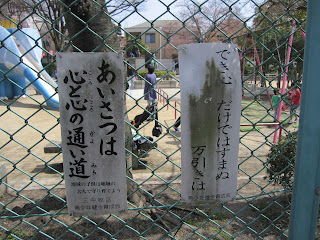Once in a while (Sometimes) somebody asks us why we chose the name 'Artemis' for Eikaiwa Artemis, our unique English teacher - student matching system here in Osaka, Japan. I will try to explain a little.
First and foremost, I'm a mythology geek (shinwa no otaku desu)!
Shinwa = Myth(s); Legends. Mythology = Shinwagaku
Otaku = geek, nerd.
I've loved and studied mythology all my life.
The gods and goddesses, heroes and monsters of Greek and Roman mythology have been a source of inspiration (hirameki) for me since childhood. And Artemis (Artemis is Her Greek name; the Romans called Her Diana) has always been a personal favorite. She is a moon goddess and the goddess of all living things. She is also both protector and hunter of wild animals.
Classical Mythology is.....well, CLASSIC! Artemis is a classic name from our Ancient Western Heritage.
The Greek and Roman civilizations (civilization = bunmei) are primary foundations (kiso) of Western civilization.
Today we use words in English that have their origin (kigen, hajimari = beginning, source) in Greek and Roman mythology like 'cereal' (from the goddess Ceres), the 'Olympics', and 'muse' (amuse, amusement, amusement park!), not to mention the many planets (wakusei) and stars and the signs of the zodiac (kodotai, junikyu). All this and much more in our language come from mythology!
Another reason for choosing the name Artemis is that she is the keen-eyed Goddess of the Hunt (kari no megami). She is The Huntress (ryoshi). As an expert archer (ite) she carries a bow (yumi) and arrows (ya).
Hunt = kari, hunting game; kari o suru.
In English, "to hunt" can also mean: sagashi, search, sagasu, search for.
To hunt, search or look for something; like an Easter egg hunt, or to go deer hunting.
Artemis is also unmarried and fiercely independent. She has a wild side!
These characteristics (tokucho-teki) are a symbol (shocho) of our student's individual (koji-no), and independent (dokuritsu shiteiru) search for English study to suit or accommodate (tekio saseru) their personal needs or reasons.
The uniquely personalized teacher - student matching system of Eikaiwa Artemis allows students the freedom to meet an English teacher for one-on-one English lessons at times that are convenient for them.
Eikaiwa Artemis Teachers and students can take aim (nerau)
aim: mokuteki (purpose)
mato (goal)
nerau (point)
mezasu (intend)
...and focus (shoten) upon the individual student's needs... much like The Huntress Artemis takes aim with Her bow and arrow to hit her target, her personal goals.
The English student must make a personal commitment to set goals and, having spotted their target....
the student readys, aims, fires!

Some students need English for international travel, some study more advanced grammar and vocabulary related to their jobs and careers. Most students welcome and enjoy the one-on-one conversational English practice. Together, the teacher and student can set goals, but a lot of foreign language study is up to the individual student's commitment (sekinin = responsibility, kenshin = devotion) to practice and study on their own to reach their target. The student must hunt, must pursue (chase = oikakeru; tsuzukeru = carry on; tsuikyu suru = search for, commit oneself to, the study of English.
Eikaiwa Artemis Toyonaka tries to facilitate (yoi ni suru) this growing individual need for private English practice by matching students to teachers based on individual requirements. We hope that we make successful matches between English language teachers and students which will foster and nurture (sodateru) our student's growing English language ability through lessons, chat-time events, and sometimes taking field trips together. It makes us proud and happy to see students commit to improving their English skills. This is the more domestic (katei no) or motherly side of Artemis, as Mother of All Living Things....























